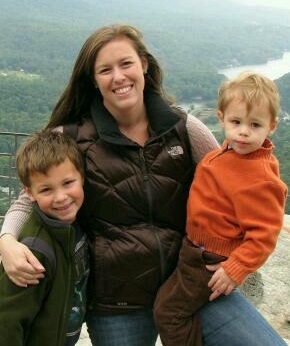 This week we interviewed inspiring individual Nicole Baker. Nicole has a Master of Arts in Psychology and is also a Specialist in Education with a concentration in Special Education. She’s also a Licensed Psychological Associate. Nicole founded and runs the Academic Assessment Center in Asheville, NC where we frequently refer families. Enjoy her thoughts on educational environments, parent advocacy, and more--including her own experiences being diagnosed with dyslexia.
Camp Spring Creek: What is your area of specialty?
This week we interviewed inspiring individual Nicole Baker. Nicole has a Master of Arts in Psychology and is also a Specialist in Education with a concentration in Special Education. She’s also a Licensed Psychological Associate. Nicole founded and runs the Academic Assessment Center in Asheville, NC where we frequently refer families. Enjoy her thoughts on educational environments, parent advocacy, and more--including her own experiences being diagnosed with dyslexia.
Camp Spring Creek: What is your area of specialty?
Nicole Baker: My specialty is children, reading, education, and implementing interventions within school systems. I assess children with standardized tests, but at the same time I look at their behaviors when performing academic tasks. We talk about school (what is fun, what is hard, what is easy, etc.) and I compile a report with my findings and suggestions for curriculum planning and accommodations. I also consider modifications that I think will be most helpful for the student. When doing this, I like to reference current literature and research and draw upon my individual experience as a learner with dyslexia. I use a multifaceted approach that is individualized to each student and takes into account their needs and applies best practices. In the end, my job is to identify a child’s needs and create a plan for them to succeed academically.
CSC: What are the most common psychological difficulties that children with dyslexia face and why do you suppose that is the case?
NB: I believe that ALL preschool and kindergarten education programs should be multisensory and developed around the Montessori/multisensory methodology of education. It is my belief that this type of education will do two things. First, it will help with early identification of students with learning differences. Second, it will help kids that may not be 100% LD make the early gains necessary to not go down the LD path. Strong, early multisensory education that is peace-centered and based in imaginary/play while also fostering independent learning ultimately builds the strong, early skills needed to form an exceptional backbone for future learning. Quality early childhood education is ESSENTIAL.
I also find that, in most cases, learning differences are being identified too late. I often get students in my office at the 3rd and 4th grade levels that are just being flagged as struggling in the classroom. Parents will often say that they asked teachers early at the kindergarten or 1st grade level, and they were told “it is too early to tell; you need to wait.” This is incorrect!
CSC: Recognizing that you respect the confidentiality of your clients, is it possible for you to tell us in general/anonymous terms about a particular moment of "ah-hah" or realization that you had with a child in your practice? What did you learn in that moment and what corner do you think the child turned?
NB: I work with a lot of high school and college age kids who are frustrated that their LD (dyslexia, ADHD, Executive Dysfunction, etc.) makes learning “hard.” I tell kids all the time: “Life is hard, but worth the work.” I think we are setting kids up for failure by letting them believe life is going to be easy or by protecting them from failure. I tell clients that my failures and struggles as an undiagnosed dyslexic have made me a tough, hard, worker who will almost never give up. If you want something bad enough, then it is worth working for. Beat the challenge and see how good it feels. I know better than anyone how hard your struggle feels, but if you find the one thing that you are passionate about (in my case psychology, reading, children) I call it a “hook,” then you can read higher than your reading level, comprehend better than any of these tests say, and “beat the odds” because that’s what LD kids do. We/dyslexic kids are great at thinking outside of the box and making things happen. Find your “hook” and make it happen!
CSC: If you could give one message to parents and educators of children with dyslexia, what would that message be?
NB: I would say to surround your children with books, music, art, and love. Turn off the darn TV and put down the cell phone (advice I should follow myself). All of these things will make he/she well-rounded, develop their vocabulary and experiential knowledge, and give them a sense of peace and well-being. Reading to your children and exposing them to books and print increases print awareness, love of reading, and general reading skills. Homes and schools filled with books, poetry, music, and art are fun, peaceful places where children can learn and grow happily.
Also, follow your parental intuition. If you feel early on in your child’s development that there is an issue or a need that your child has, listen to your gut and pursue answers. Further, pursue multiple opinions and work with people you are comfortable with and that you trust. If an answer, report, or finding from an expert feels wrong or off and doesn’t reflect what you honestly see in your child on a day-to-day basis, then dig deeper. Always be your child’s biggest advocate!
